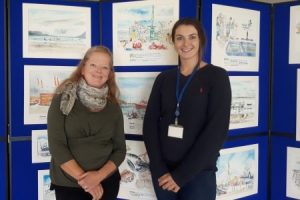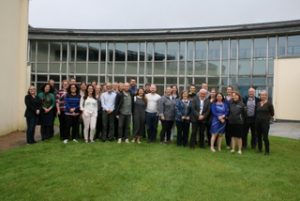A series of ill ustrations about the importance of the ocean to the coastal communities of Ireland and Wales were unveiled at the Marine Institute, as part of a BlueFish Project meeting.
ustrations about the importance of the ocean to the coastal communities of Ireland and Wales were unveiled at the Marine Institute, as part of a BlueFish Project meeting.
BlueFish is a marine science research project focusing on the importance of the ocean to economic activities of coastal communities and potential impacts of climate change.
Galway’s urban sketcher Róisín Curé and Sharon Sugrue, Science Technical Officer Marine Institute, travelled to Dingle Co Kerry, Baltimore Co Cork and Howth in Co Dublin to document fishing, aquaculture industry and leisure activities. The watercolour illustrations show the people whose livelihoods are dependent on the ocean and who have a profound and immediate interest in the effects of climate change.
Speaking about her involvement in the BlueFish Project, Ms Curé said, “I felt privileged to sketch, at close quarters, people whose human ingenuity has turned a potentially hostile ocean into a source of income. I hope that same ingenuity will provide the answers to the challenges we’re facing.”
Sharon Sugrue, Marine Institute, also interviewed fishermen, skippers and restaurateurs to gather an understanding about how they benefit from the ocean and their thoughts on climate change.
“Our ocean supports a wide range of industries, from fishing and seafood to tourism, recreation and culture,” Ms Sugrue said. “This aspect of the BlueFish Project offered an opportunity to engage with those living and working in coastal communities to get them thinking about climate change and possible impacts.”
Wexford graphic designer, Karen Nolan, also produced graphic diagrams which portray the industries and ecosystems connected to the Irish and Celtic Sea. These diagrams will be used by BlueFish partners at meetings and events.
Dr Paul Connolly, Director of Fisheries Ecosystems Advisory Services at the Marine Institute said, “By combining art and science, we are able to engage people in the coastal communities of Ireland and Wales to think about climate change, and how the ocean has a huge impact on their lives. The artwork captures our ocean ecosystems and will be used to explain complex concepts to policy makers, the fishing industry and other stakeholders.”
For the next stage of the project, Róisín Curé and Sharon Sugrue will visit coastal communities in Wales during October 2018 to document the people and industries connected to the ocean. The artworks and content from the interviews will be used to engage with the wider community at maritime festivals and events in Ireland and Wales. The completed artworks will also be available to view online in November 2018.
BlueFish aims to develop knowledge and understanding of the marine resources of the Irish Sea and Celtic Sea and examine the effects on and potential vulnerability of selected commercial fish and shellfish from predicted climate change.
The BlueFish Project is coordinated by Bangor University and involves scientists from Aberystwyth University and Swansea University in Wales and the Marine Institute, Bord Iascaigh Mhara and University College Cork in Ireland.
Thirty scientists from the six partner organisations attended the BlueFish Project meeting, which included an overview of current progress and identified further areas for collaboration between the partners.
“Climate change is already affecting the world’s oceans and coasts, and the consequences of present and predicted climate effects to fish, shellfish and aquaculture in the Irish and Celtic Seas is poorly understood,” Dr Connolly said.
“Through the transfer of knowledge, expertise and best practice, the BlueFish Project aims to provide region-wide adaptation strategies for the benefit of coastal communities, by identifying risks and opportunities for coastal communities who depend on commercial fish and shellfish.”
The Marine Institute are involved in three key areas of the BlueFish Project and outputs from these areas were presented by Niall O’Maoileidigh and Ross O’Neill (Sea Bass Case Study), Oliver Tully and Michael Sheridan (Scallop Case Study) and Dr Paul Connolly and Sharon Sugrue (linking art and science to inform stakeholders).
The next meeting on the BlueFish Project is scheduled to take place in Wales in early March 2019.



Sorry, comments are closed for this post.